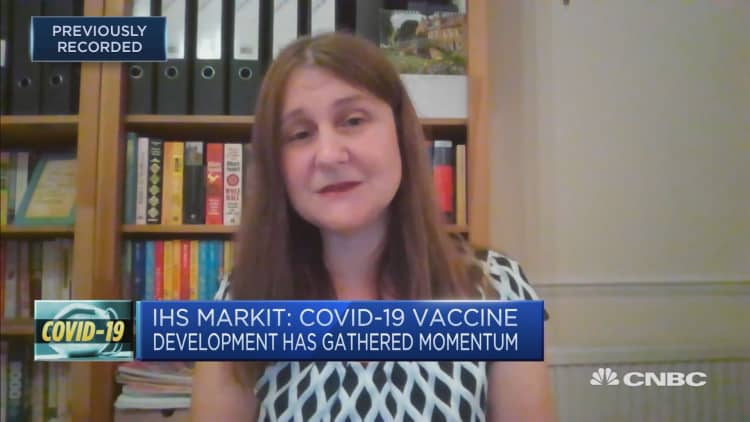
As the race to develop a vaccine for the coronavirus speeds up, the pharmaceutical industry is being careful to not set any dangerous precedent that may weaken their future intellectual property rights, a senior executive at IHS Markit said Thursday.
The World Health Organization this week published an update on the potential vaccine candidates that are in development for Covid-19. Currently, 21 candidate vaccines are in clinical trials, meaning they are being tested on human volunteers. Three are reportedly in the third phase of those trials.
"With vaccine development for Covid-19, pharmaceutical companies are certainly being very careful," Milena Izmirlieva, director of life sciences research at IHS Markit, said on CNBC's "Squawk Box Asia."
She explained there have been calls for future Covid-19 vaccines to be treated as a public good, which would mean that they would be provided to everyone, without profit.
"That suggests that there is, as far as policymakers are concerned, an understanding that there could be potential weakening of intellectual property rights for a future successfully developed vaccine," she said, adding it "would be priced at a level that allows it to be widely used on a global level."
U.K.-headquartered pharmaceutical company AstraZeneca, China's Sinovac Biotech and U.S. biotech firm Moderna are the companies furthest along in developing their vaccine candidates.
Research and development for potential vaccines are expensive and risky, especially if a candidate fails during clinical trials. Intellectual property rights and patents, which give exclusivity and price control, are fundamental to the pharmaceutical industry as they enable companies to undertake costly research with the promise of future profits.
"So, that concept of public good is something that could be potentially sending warning bells for the pharmaceutical industry," Izmirlieva said. She explained that still, the sector has had a lot of investment commitments to purchase a vaccine, which would allow them to start manufacturing despite the risks.
"I think currently the industry's preference has been not to set a dangerous precedent in terms of weakening intellectual property rights. I think the preference has been to find alternative ways of manufacturing that would allow some of the low income and middle-income countries to access a vaccine relatively quickly," she added.
Izmirlieva cited AstraZeneca's licensing agreement with the Serum Institute of India to supply one billion doses of the University of Oxford's potential Covid-19 vaccine, AZD1222, for low-and-middle-income countries, as an example of such alternatives.


